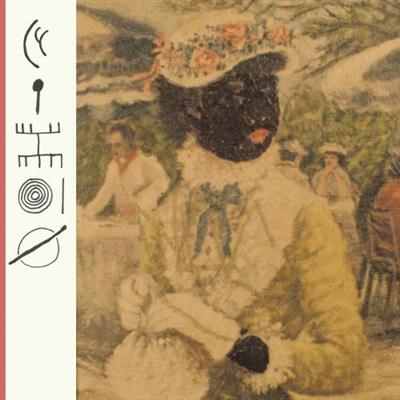Africanus Okokon is a visual artist, a specialist in collage, video and animation. Turkson Side, his debut album, is almost entirely made up of samples, stitched together with conspicuous thread. It’s obvious that there is an appealing intellectual challenge for Okokon in this. But is applying the principles of his art to his music a worthwhile listen for the rest of us?
It’s a good start that it’s released on the eclectic (if sometimes indiscriminate) Other People, the label founded by Nicolas Jaar. Initially, Okokon delivers. ‘Asphalt’, the fifteen-minute opener, is impressive and sporadically catchy. Kinetic rhythms, half-tuned radios, keyboard mashing, backwards incantation, crickets, and electrical storms all feature, or are suggested, by free-association. Here, Okokon uses samples to mimic what might go through a magpie mind left with a quarter of an hour to space-stare. It gets better with familiarity, too: something that sounded like a tropical bird cry at first might, the second time around, transform into a sonar ping.
In fact ‘Asphalt’ is so good that it leaves the rest of the album somewhat quivering in its wake. Its unmoored and mostly unrecognisable samples, so skillfully reconstructed on ‘Asphalt’, elsewhere just boil down to a grey and forgettable mush.
There are, however, two notable exceptions. The first is ‘Contelast’, the album’s only mischievous track. It’s initially built around a laconic Britney Spears vocal sample (from the closest she got to avant-R&B, 2009’s ‘Break The Ice’) over the bland tinkle of a factory-setting ringtone. This soon gives way to unhurried percussion, which in itself is destabilised by high-pitched hums. The effect is an axis-free spin, all the more nauseous for its apparent slow speed.
The other is ‘Wrake’, a home recording of Okokon playing the krar, an Ethiopian lyre, which has strong associations in its home country. Unlike the larger ten-string beganna lyre, which is associated with devotional music and considered sacred, the krar is traditionally thought of, quite literally, as Satan’s instrument. Okokon plays it gently and imperfectly, and the result is almost mournful. By rights, ‘Wrake’ should stick out among the found sounds of Turkson Side, but instead it manages to sound every bit as sampled as the rest of the album. It could have been from a Robbie Basho experiment, or an early Devendra Banhart sketch. It’s laudable that, even when he isn’t using samples, Okokon gets the listener thinking about the role of instruments outside of their expected context, especially when played by Western musicians: where does admiration end and exploitation begin? ‘Wrake’ works both as a challenge to what we think of as authentic, and as a bewitching track in its own right.
Despite these high points, Turkson Side does often feel like a trifle, a time-passer for Okokon between artistic commissions. The debut album by The Young Gods is 28 years old, and DJ Shadow’s Endtroducing is 19. Those records really did retool sampling, and one might reasonably hope that a sample-dominated album in 2015, would be a stronger statement than this.
<div class="fb-comments" data-href="http://thequietus.com/articles/19283-okokon-turkson-side-review” data-width="550">


